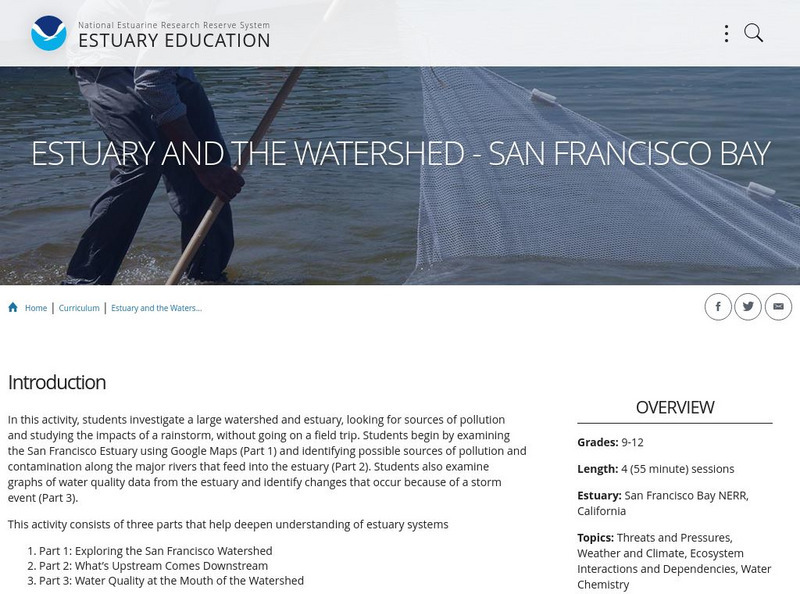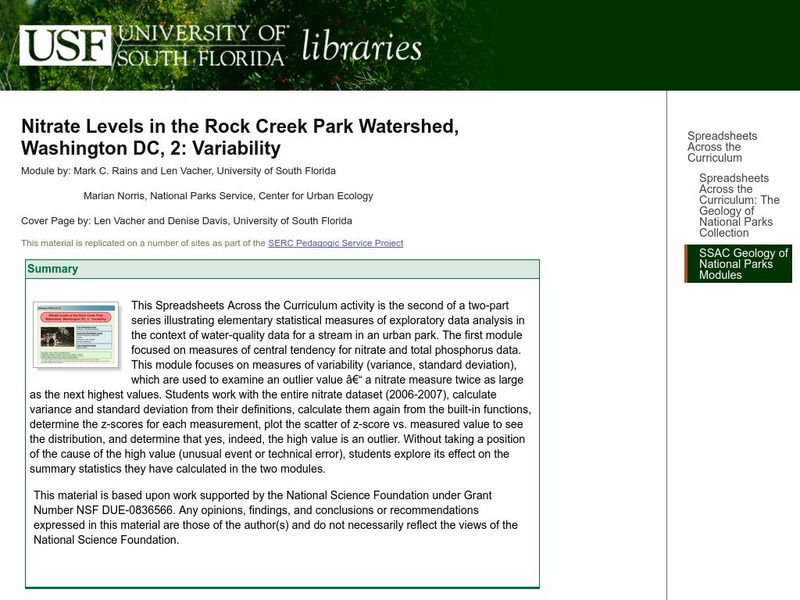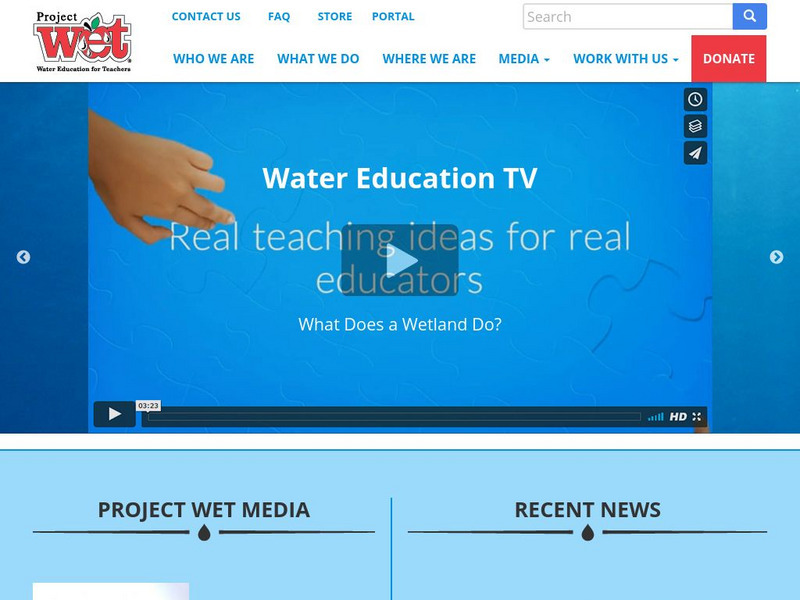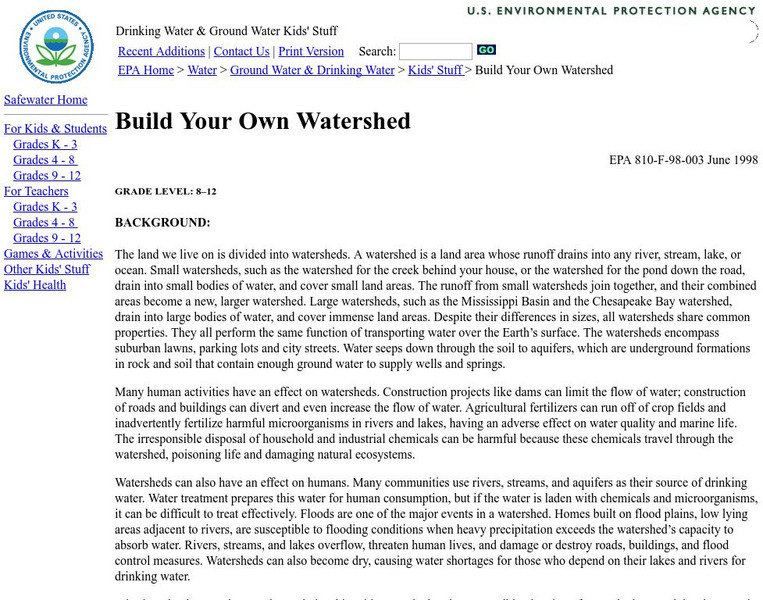Utah Education Network
Uen: Water Pollution Graphing: Bugs Don't Bug Me
Activity shows the link between land use activities within a watershed and water quality.
PBS
Pbs Learning Media: Environmental Public Health: Human Impact on Water Quality
In this lesson, students explore human impact on water resources, investigate the quality of their community's water supply, and consider ways to clean up and avoid further pollution. (Note: Some of the links may no longer work and...
Nature Conservancy
Nature Works Everywhere: How Natural Areas Filter Water
By studying nature's filters, students learn about the importance of water quality for human health and agriculture.[4 min, 6 sec] Includes lesson plan and student handouts.
Science Education Resource Center at Carleton College
Serc: Water Sheds and Water Quality
Included here is a collection of activities to teach students about watersheds and pollution.
Other
Bscs: Asking and Answering Questions With Data
In this self-directed lesson, students use graphs and maps of water quality to investigate relationships between variables to answer questions. A handout with everything the student needs to complete this lesson is available as a PDF or...
US Geological Survey
Usgs: Water Science for Schools Water Science Storytime!
This U.S. Geological Survey website features a fictious town, Dryville, and uses it to illustrate every aspect of water management that you might encounter. Click Home to access the site in Spanish.
Nature Conservancy
The Nature Conservancy: Gardens Activity Guide: Water
In this guide helps students understand their garden as a model watershed through the collection and analysis of rainwater filtration data.[4.06]
NOAA
Noaa: Estuaries 101 Curriculum: Estuary and the Watershed San Francisco Bay
In this activity, students investigate a large watershed, look for sources of pollution in the watershed, and study the impacts of a rain storm on a watershed and estuary, without going on a field trip. Students investigate the nature of...
US Geological Survey
Usgs: Water Science for Schools Activities Center
This website offers three activity centers: Questionnaires, Opinion Surveys, and Challenge Questions. Take a look at these interesting water research activities from the US Geological Survey. Click Home to access the site in Spanish.
Science Education Resource Center at Carleton College
Serc: Nitrate Levels in the Rock Creek Park Watershed: Variability
Learning module focuses on measures of variability such as range, variance, and standard deviation which are used to examine nitrate levels and water quality.
US Environmental Protection Agency
Epa: Surf Your Watershed
This resource provides information on watersheds, maps, activities, and links to local watershed information.
Other
Project Wet Water Education for Teachers
Non-profit education program dedicated to increasing awareness of water resources through classroom activities and hands-on experience. Lesson plans designed for K-12 students. Site available in English, Spanish, and French.
TeachEngineering
Teach Engineering: Can You Catch the Water?
Students construct a three-dimensional model of a water catchment basin using everyday objects to create hills, mountains, valleys and water sources. They experiment to see where rain travels and collects, and survey water pathways to...
US Environmental Protection Agency
Epa: Build Your Own Watershed
How can you learn to build your own watershed? This site features an activity to illustrate the basic properties of a watershed. Don't miss out.
NOAA
Noaa: Chesapeake Bay Interpretive Buoy System: Data in the Classroom
NOAA Smart Buoys collect and transmit real-time weather, water conditions, and water quality data. Chesapeake Exploration gives teachers and their students unprecedented access to lessons designed around real-time observational data from...
Other
Derm: Water Cycles and Catchments
Students develop an understanding of the water cycle and water catchments. This learning module is divided into introductory, developmental, and culminating activities, and also has several assessment strategies. Resource sheets...
US Environmental Protection Agency
Epa: Why Are Wetlands Important?
Find out why wetlands provide natural water quality, flood protection, erosion control, recreation and aesthetic appreciation, and natural products.
Science Education Resource Center at Carleton College
Serc: Nitrate Levels in the Rock Creek Park Watershed: Meas of Central Tendency
Activity uses water-quality data from Rock Creek Park to illustrate elementary statistical measures of exploratory data analysis. The focus of the lesson is the nutrient limitation in a stream and the three measures of central tendency.
PBS
Pbs Learning Media: Why We Should Protect Freshwater Mussels
In this interactive lesson, students will increase their understanding of the important role that freshwater mussels play in our watershed. Students will learn about freshwater mussel species, how mussels improve water quality in rivers...
BSCS Science Learning
Bscs: Chesapeake Bay Algal Blooms
In this inquiry, students engage with mapping data to determine what kind of land coverage is contributing the most to harmful algal blooms in the Chesapeake Bay Watershed. Click on the link for teacher resources for teaching guides and...
US Geological Survey
U.s. Geological Survey: Groundwater Information by Topic
A massive amount of information about groundwater. Topics covered include groundwater basics, humans and groundwater, groundwater quality, and its place in the water cycle. Includes true-and-false quiz and a Q&A section, as well as a...
Climate Literacy
Clean: Colorado River Supply
Students examine available data of water in the Colorado River Basin, study the possible consequences of changes to various user groups, and suggest solutions to adapt to these changes.
US Environmental Protection Agency
Epa: Where Does Your Water Come From? [Pdf]
Where does your drinking water come from? This resource features a clear and concise explanation for this question. This resource will be beneficial to young scholars and teachers.
Utah Education Network
Uen: If Bugs Could Talk Bugs Don't Bug Me
Evaluate the quality of a "water sample" and form a hypothesis about the land use near the location their "water sample" was collected.
















![Epa: Where Does Your Water Come From? [Pdf] Lesson Plan Epa: Where Does Your Water Come From? [Pdf] Lesson Plan](https://content.lessonplanet.com/knovation/original/41160-83ff7c05b0f0460206fa551d2700d8dc.jpg?1661270414)